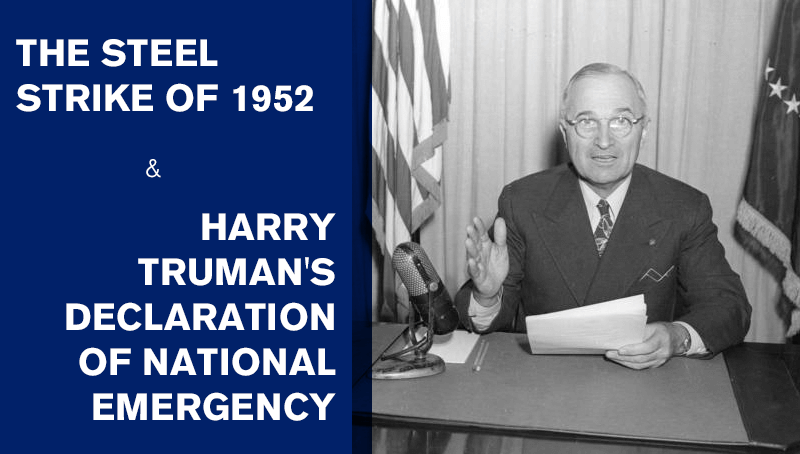Harry Truman’s National Emergency | January 14, 2019

The Steel Strike of 1952 and Harry Truman’s Declaration of National Emergency
Using his executive powers, Harry S. Truman declared a “limited” National Emergency on December 16, 1950 under the perceived threat of communism spreading throughout the globe via North Korean forces.
Now, THEREFORE, I, HARRY S. TRUMAN, president of the United States of America, do proclaim the existence of a national emergency, which requires that the military, naval, air, and civilian defenses of this country be strengthened as speedily as possible to the end that we may be able to repel any and all threats against our national security and to fulfill our responsibilities in the efforts being made through the United Nations and otherwise to bring about lasting peace.
Read the full Declaration here.
As the Korean War raged on, on the home front, the American steel industry began its own battle over wage increases.
On April 8, 1952, Truman took matters into his own hands arguing that steel worker strikes and standoffs between the steel companies and the unions could not persist during wartime.
Truman issued Executive Order 10340 giving full control of the steel industry to the Secretary of Commerce for the purposes of wartime production. Thus, Truman attempted to nationalize the steel industry.
NOW, THEREFORE, by virtue of the authority vested in me by the Constitution and laws of the United States, and as President of the United States and Commander in Chief of the armed forces of the United States, it is hereby ordered as follows:
1. The Secretary of Commerce is hereby authorized and directed to take possession of all or such of the plants, facilities, and other property of the companies named in the list attached hereto, or any part thereof, as he may deem necessary in the interests of national defense; and to operate or to arrange for the operation thereof and to do all things necessary for, or incidental to, such operation.
Read the full Executive Order here.
Truman also beseeched the American people directly regarding his Executive Order:
My fellow Americans:
Tonight, our country faces a grave danger. We are faced by the possibility that at midnight tonight the steel industry will be shut down. This must not happen.
Steel is our key industry. It is vital to the defense effort. It is vital to peace.
Read Truman’s full address here.
Truman’s Executive Order nationalizing the steel industry on the basis of necessity for wartime production resulted in the Supreme Court’s involvement.
At the time, no formal law existed to provide the precedent for Truman to nationalize the steel industry.
Despite Truman’s argument that his position as commander-in-chief afforded him the power to make all military decisions (which it technically did), the Supreme Court ultimately ruled that Truman lacked the constitutional authority to nationalize the steel industry despite the ongoing state of emergency declared by Truman two years prior.

Natalie Walker is Museum / Archives Technician at the Truman Library Institute and is currently finishing a Master’s in Public History at Colorado State University.
Join our email list to receive event updates and the latest Truman news right in your inbox:


